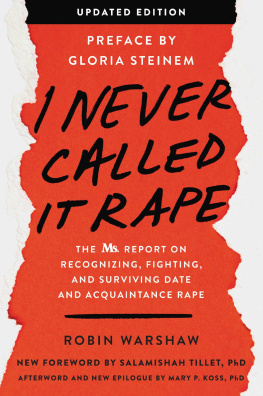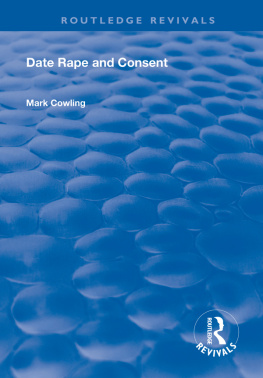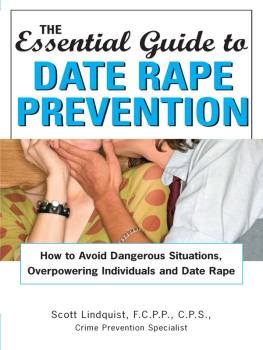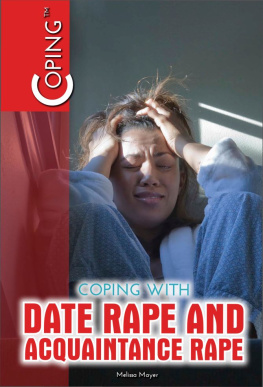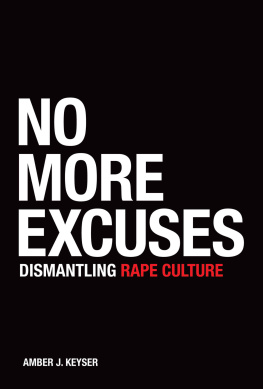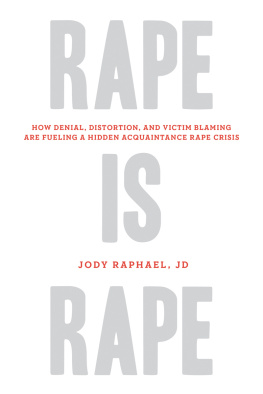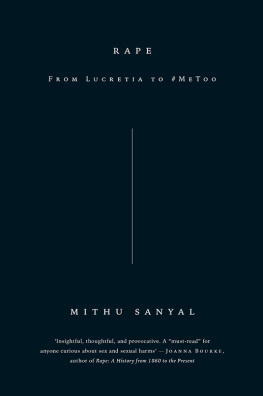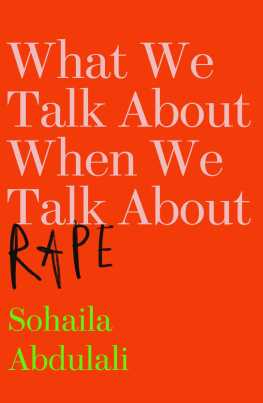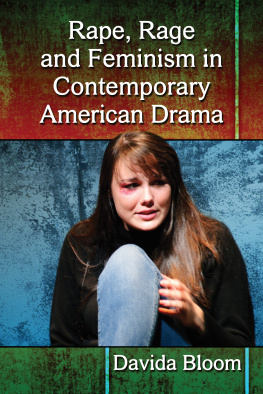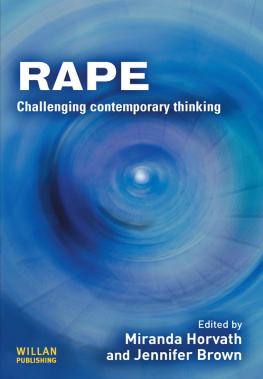Contents
Guide
Australia
HarperCollins Publishers Australia Pty. Ltd.
Level 13, 201 Elizabeth Street
Sydney, NSW 2000, Australia
www.harpercollins.com.au
Canada
HarperCollins Publishers Ltd
Bay Adelaide Centre, East Tower
22 Adelaide Street West, 41st Floor
Toronto, Ontario, Canada
M5H 4E3
www.harpercollins.ca
India
HarperCollins India
A 75, Sector 57
Noida
Uttar Pradesh 201 301
www.harpercollins.co.in
New Zealand
HarperCollins Publishers New Zealand
Unit D1, 63 Apollo Drive
Rosedale 0632
Auckland, New Zealand
www.harpercollins.co.nz
United Kingdom
HarperCollins Publishers Ltd.
1 London Bridge Street
London SE1 9GF, UK
www.harpercollins.co.uk
United States
HarperCollins Publishers Inc.
195 Broadway
New York, NY 10007
www.harpercollins.com
Consulting Editor
Ellen Sweet
Previous editions of this book were published in 1988 and 1994 by Harper & Row, Publishers.
I NEVER CALLED IT RAPE: UPDATED EDITION . Copyright 1988, 1994, 2019 by the Ms. Foundation for Education and Communication, Inc., and Sarah Lazin Books. Foreword to the HarperPerennial edition copyright 1994, 2019 by Robin Warshaw. All rights reserved under International and Pan-American Copyright Conventions. By payment of the required fees, you have been granted the nonexclusive, nontransferable right to access and read the text of this e-book on-screen. No part of this text may be reproduced, transmitted, downloaded, decompiled, reverse-engineered, or stored in or introduced into any information storage and retrieval system, in any form or by any means, whether electronic or mechanical, now known or hereafter invented, without the express written permission of HarperCollins e-books.
COVER PHOTOGRAPH BAONA/ISTOCK/GETTY IMAGES
FIRST HARPER PERENNIAL EDITION PUBLISHED 1994, UPDATED 2019 .
Library of Congress Cataloging-in-Publication Data
Warshaw, Robin
I never called it rape.
Ms. magazine/Sarah Lazin Books.
Includes index.
1. Acquaintance rapeUnited StatesCase studies. 2. Rape victimsUnited StatesCase studies. 3. RapeUnited StatesPrevention. 1. Koss, Mary P.
I. Ms. III. Title.
HV6561.W38 1988362.88 87-46180
ISBN 0-06-092572-8
Digital Edition MARCH 2019 ISBN: 978-0-06-268587-2
Version 03092019
Print ISBN: 978-0-06-284430-9
Contents
If you have been forced to have sex by a date or an acquaintance, please read this before going any further.
Its hard to believe when rape happens to you, especially when the rapist is a man you know. But understand this: You have been raped. It was not your fault. And you are not alone.
Even if you have never heard of such a thing before, youve just survived the most common type of rape that occurs to women.
And survived is the right word. Rape is a life-threatening experience. Dont try to tough it out alonegetting help is not a sign of weakness. In the long run, talking to someone about the rape will give you greater strength and help you recover more quickly and more completely. Tell someonea trusted friend, a close family member, a teacher. Also call a local rape-crisis hot line, womens center, or counseling center. Youll benefit from talking with a professional and such counseling is often free and always confidential.
You may want to turn immediately to , What to Do If Acquaintance Rape Happens to You. When you are ready, you may want to read the rest of this book (and some of the material in the Resources section) for a fuller understanding of acquaintance rape and its aftereffects. Later, you may also want to talk with your female friends and other women about your experience and theirs. Many communities have support groups for rape victims, as do some colleges and universities. These groups can help you regain your equilibrium.
If you were the victim of date rape or acquaintance rape in an incident that occurred years ago but never talked to anyone about it, do so now. Rape-crisis counselors offer their services no matter when your rape occurred. Its important for you to understand your rape experience in order to move on to a happier future.
All of the rape victims included in this book appear with first names only, and those names are fictitious (as are the names of their attackers). The other details of these womens experiences have not been changed, although some information that might specifically identify them has been omitted.
Gloria Steinem
When my mother was in high school, raped was not a word fit to write in newspapers, and reporters used such polite euphemisms as interfered with. When I was in high school, a classmate was locked up in a garage and gang raped by players on our football team. She was then the subject of a whispering campaign, and her family moved away in disgrace, yet the team continued to be a source of pride for the neighborhood and university scholarships for some of the players. Altogether, it was assumed that a woman who got raped was ruined. She was way more likely to be punished by society than her rapist was to be punished by the criminal justice system.
If scenes like these seem less likely to happen todaythanks to many brave survivors who have told their stories to the police and the public, and now thanks to the #MeToo and Times Up movementsyou will understand why some of us have hope. Its because we remember when sexualized violence was rarely reported or even named.
Now, most countries gather statistics on such violence in all its forms, and the United Nations and other governmental bodies issue global reports on their prevalence. As a result, we know that sexualized violencefrom sexual harassment and assault to honor killings and even female infanticidehas created a world in which there are, for what seems to be the first time in human history, fewer females than males. According to the United Nations Population Division, in 2016 there were 66 million more men in the world than there were women.
Since these cruel facts of the present are unacceptable, you will also understand why so many womenand men, tooare marching and organizing in countries around the world to change these ugly truths. This is also what we are supporting in this book as writers and organizers. It is what we hope you will do in your homes, workplaces, and streets in whatever way you can.
Whatever the time or the reason you are entering this worldwide movement against sexualized violence, you are welcome and you are needed. It will take a big, diverse, multigenerational, and global wave of energy and ideasincluding personal truth telling and Internet activism, courage and patience, raising hell and also raising our children in new waysto diminish this violence. Patriarchy by its very definition is a family or nation state in which authority, descent, naming, and inheritance go through the male line, and on which its women and children are dependent. It means that men or male-dominated political and religious systems must control the bodies of women in order to control reproduction. In most societies, this control is doubly important as a way to keep races, castes, or classes separate in the long run.
But the simple truth is that sexes, races, castes, and classes share infinitely more as human beings than we do by any categorization. Yet recognizing our shared humanity would mean that one part of the human race would have to give up controlling another part with violence. Indeed, one part of the human race cannot control another part without violence or the threat of violence. This may take the form of culturally inherited and enforced roles that cast the masculine as dominant and the feminine as submissive. Or there may be physical violence that ranges from the clitoridectomy of female children in some parts of the world to the beating and murder of women in the United States. In both cases, these crimes are most likely to be committed by the people we live with, not by strangers. Sexualized violence is a way of empowering half the human race against the other half. Its all about male control of wombs and reproduction.
Next page
